History of the Canadian Staff Band
The first Canadian Staff Band consisted of about 18 members who accompanied General William Booth, The Salvation Army's Founder, through Eastern Canada, usually traveling on the same train. When the train stopped at each appointed city, the band would immediately form up and play while the General left the train and was greeted by officers and dignitaries. The band would then lead the parade to the hall chosen for the General's meeting. Although this band only lasted for a little more than a year, it received many good reports on its playing.
1912 Staff Band
"Wanted: Bandsmen who are good instrumentalists, to volunteer for service in a Permanent Brass Band for the Household Troops. We are anxious to raise a good Permanent Brass Band (similar to that led by Staff-Captain Appleby), to travel through the towns and villages of the Dominion, and for duty in special demonstrations. Also to conduct, under an experienced Staff-Officer, weekly and fortnightly Special Campaigns, for the Salvation of Souls. No pay will be given. Any thoroughly converted Bandsman who would like to devote himself altogether to the Salvation of Souls, should apply at once to the Commissioner. Let every applicant say what instrument he can play, and if he can provide a uniform or $12 to get one."
1914 Staff Band
From a large number of applications, the second Staff Band originated. It consisted of 20 players and was known as the Household Troops Band, modeled after a similar group in England. Staff-Captain McHardy was the executive officer and Captain Leonard the bandmaster. They played at summer camp meetings on Wells Hill (now Casa Loma) in Toronto, where they were formally commissioned. Their first trip was by boat to Niagara Falls.
A third Staff Band was in existence during General Booth's visit of 1898 and accompanied him to various cities. This was followed by a fourth group, formed in 1907. It was called the Territorial Staff Band and over a seven-year period consisted of 36 to 42 members. In the early hours of May 29, 1914, while on its way to the Army’s International Congress in London, England, the ship on which they were traveling - the Empress of Ireland - was struck by the Norwegian collier Storstad and sank in 14 minutes. Only eight bandsmen survived.
Following this tra
gedy, a fifth Staff Band existed for a short period of time during 1917-18. It consisted of 17 members made up of survivors of the Empress of Ireland and other headquarters staff, and lasted for about a year.
Major Norman Bearcroft 1969 - 1976
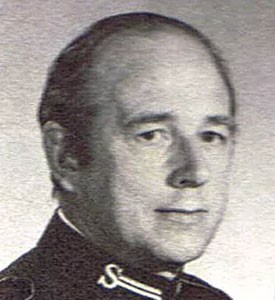 After an absence of more than 50 years, it is interesting to note that the possibility of reforming a Canadian Staff Band was discussed on the waters of the Atlantic as Major Norman Bearcroft and his wife, Jill, made their way to Canada in 1968. Norman had been appointed as Territorial Music Secretary, and following a number of interviews with the Territorial Commander, Commissioner Clarence Wiseman, the concept soon became a reality. Although there was some opposition, a few key musicians, officers and leaders were brought together in late summer to plan the formation of a new staff band. Major Bearcroft casually visited a number of corps within easy reach of Toronto, listening to the players to ascertain their ability and potential role in the new group. The Army's financial secretary agreed to a loan to fund the band and the trade secretary helped supply some converted pitch instruments. This, together with a generous gift of three instruments and music, set the stage for the first rehearsal. Invitations and phone calls resulted in a meeting at THQ in the fourth-floor cafeteria in October 1968. Those invited were addressed by the chief secretary, Colonel Leslie Russell. Then, following a cup of tea and prayers, each bandsman made his way to the film room in 2B – the second basement. There, each man's name appeared on his appointed chair. This studio was excellent for detecting any errors... when the air conditioning unit was off!
After an absence of more than 50 years, it is interesting to note that the possibility of reforming a Canadian Staff Band was discussed on the waters of the Atlantic as Major Norman Bearcroft and his wife, Jill, made their way to Canada in 1968. Norman had been appointed as Territorial Music Secretary, and following a number of interviews with the Territorial Commander, Commissioner Clarence Wiseman, the concept soon became a reality. Although there was some opposition, a few key musicians, officers and leaders were brought together in late summer to plan the formation of a new staff band. Major Bearcroft casually visited a number of corps within easy reach of Toronto, listening to the players to ascertain their ability and potential role in the new group. The Army's financial secretary agreed to a loan to fund the band and the trade secretary helped supply some converted pitch instruments. This, together with a generous gift of three instruments and music, set the stage for the first rehearsal. Invitations and phone calls resulted in a meeting at THQ in the fourth-floor cafeteria in October 1968. Those invited were addressed by the chief secretary, Colonel Leslie Russell. Then, following a cup of tea and prayers, each bandsman made his way to the film room in 2B – the second basement. There, each man's name appeared on his appointed chair. This studio was excellent for detecting any errors... when the air conditioning unit was off!
The Inaugural Festival was held in Toronto's Bramwell Booth Temple on January 18, 1969, to a capacity crowd. The Canadian Staff Band was supported by a composite band and male chorus selected from local corps bands. Excitement was heightened as the massed band played the festival march The Canadian and one of the 1914 bandsmen, Colonel Ernest Green, carried the new flag, donated by five survivors, to the platform. Each new staff bandsman followed, smartly attired in his new uniform. Symphony of Thanksgiving was the staff band's major contribution to that historic night, presided over by Commissioner Clarence Wiseman, territorial commander.
On Sunday, the band led the meetings at Toronto Temple, and Bandmaster Bearcroft insisted on an evening march of witness. Bitter winter winds were blowing and not long into the march all attempts to keep frozen instruments working failed. The band arrived back at the Temple whistling a march!
[Historical Footnote: It is a matter of record that even before the 1969 inaugural festival, the first official engagement for the Canadian Staff Band was a program of Christmas music presented at the Toronto Harbour Light in December 1968. It became an annual tradition that continued for 36 years, until the transfer of residents to make way for the construction of a new building prevented it for the first time in 2005.]
Setting the Standard
The Canadian Staff Band soon made a name for itself as it ministered in corps small and large throughout Canada and the United States. Typical programs of the day featured numerous new compositions and arrangements by Bandmaster Bearcroft, invariably introduced by the composer in his own inimitable style. The band toured Western and Eastern Canada, visiting Newfoundland for the first time in 1971, where the band left a lasting impression. Bandsmen recall how night after night Newfoundlanders in the audience rose to their feet for the Ode to Newfoundland, featured prominently in Bearcroft's Songs of Newfoundland, written especially for the tour.
During these years, the band was also featured regularly at congresses and commissionings, including the 90th Anniversary Eastern Canada Congress in 1972, led by General Erik Wickberg at Toronto's Varsity Arena. The band also was a regular feature at the annual Spring Festivals and the Festivals of Gospel Song inaugurated by Major Bearcroft, held each November at Toronto's historic Massey Hall.
A large part of the band's musical ministry has always been through its recordings. Original LPs from these early years included The Gospel Train, Home for Christmas, Golden Slippers, Salute to Montreal, The Sound of Britain, Logos (featuring the music of Ray Steadman-Allen) and The Newfoundlander.
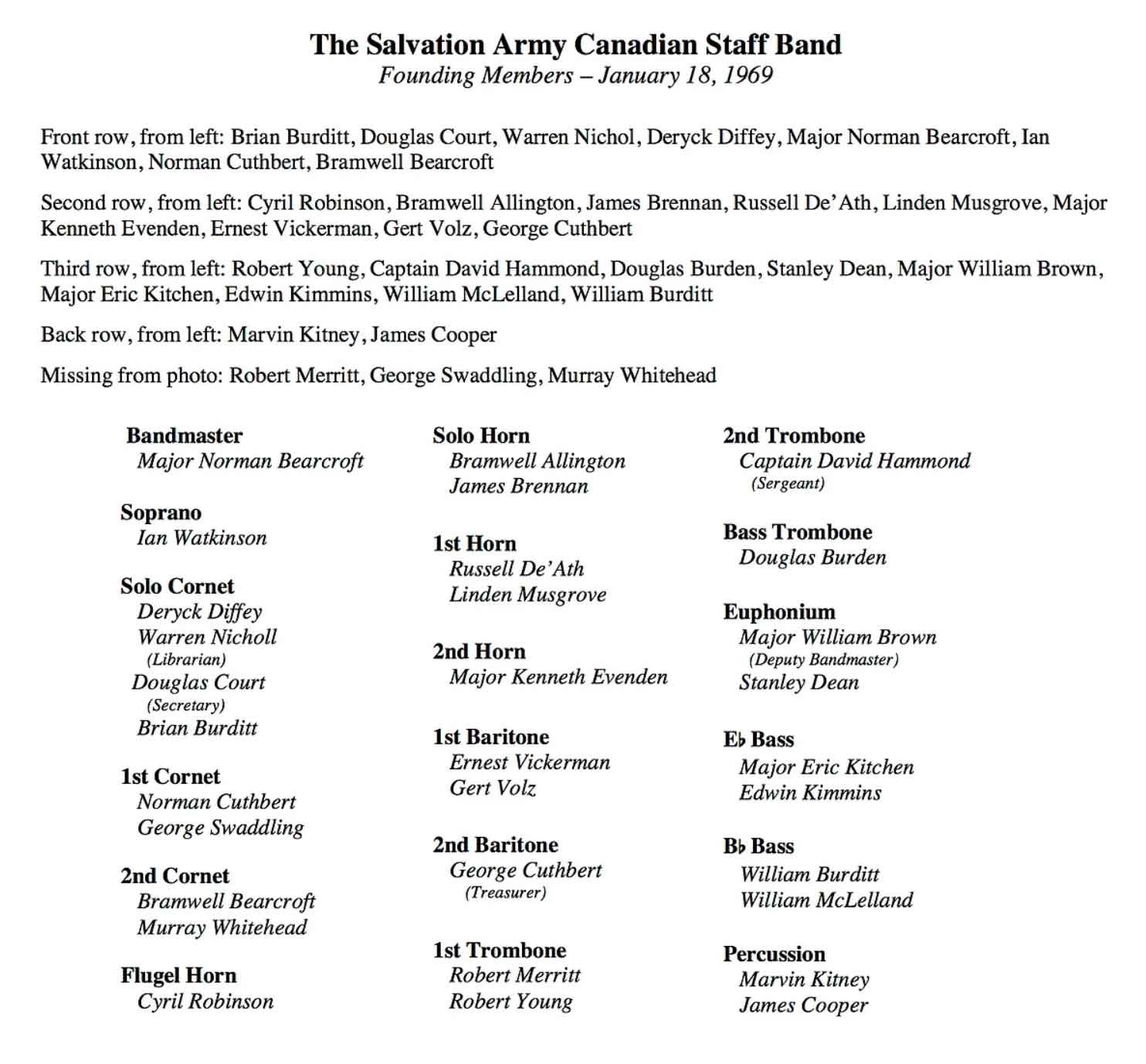
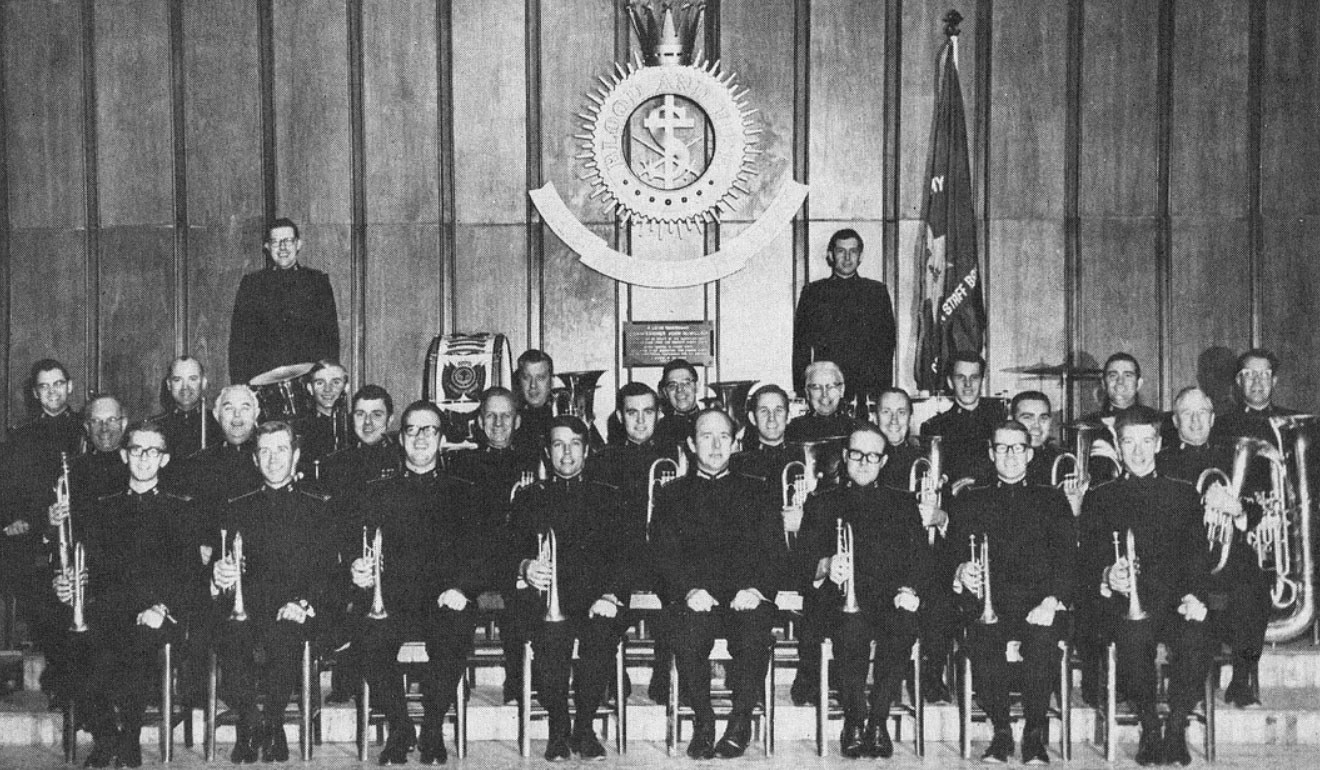
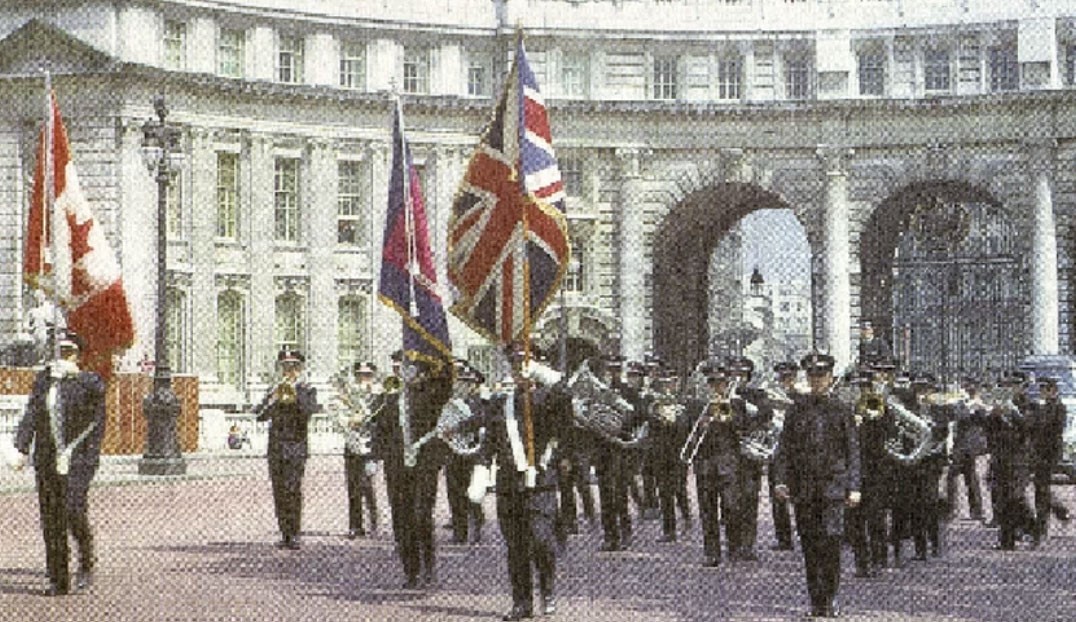
Captain Robert Redhead 1976 - 1985
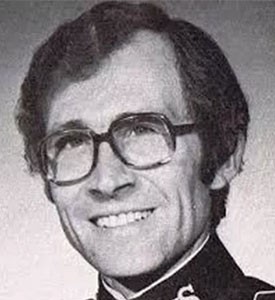 Following seven years of excellent service to the Canada and Bermuda Territory, the Bearcrofts returned to England in 1976, leaving behind an exciting, maturing staff band. The next bandmaster was also from England - Captain Robert Redhead - who arrived along with his wife, Gwenyth, and daughters Joanne and Corinne. Robert had been working in the International Music Editorial Department and was already well known for his band and vocal compositions. What a tremendous contribution the Redheads were to make in the years to come not, only to the Canadian Staff Band but to the Canada and Bermuda Territory.
Following seven years of excellent service to the Canada and Bermuda Territory, the Bearcrofts returned to England in 1976, leaving behind an exciting, maturing staff band. The next bandmaster was also from England - Captain Robert Redhead - who arrived along with his wife, Gwenyth, and daughters Joanne and Corinne. Robert had been working in the International Music Editorial Department and was already well known for his band and vocal compositions. What a tremendous contribution the Redheads were to make in the years to come not, only to the Canadian Staff Band but to the Canada and Bermuda Territory.
Bandmaster Redhead, like Bandmaster Bearcroft, added many compositions to the CSB's repertoire, while Gwen was prominent in her contribution to drama. Together they wrote two full-length stage musicals, Chains of Gold and Ruth. Inevitably, many of the more familiar songs were made into band arrangements and featured in CSB concerts.
Staff Band Tour PhotoDuring this time, the band's ministry expanded throughout the territory and around the world. In 1979, the band participated in the first Toronto Star Christmas Concert at St. Paul 's Anglican Church in Toronto, an event which has now become an annual highlight of the Christmas season. The band also continued to play for congress and commissioning events. In 1982, the band helped the territory celebrate its 100th anniversary by participating in the Centenary Congress and Commissioning in Winnipeg led by General Jarl Wahlstrom. It also made a valued contribution to the first Salvation Army festival held in Toronto's brand new Roy Thomson Hall.
In addition to touring extensively throughout Canada and the United States during these years, the band also visited Holland, Germany, Switzerland and Italy, and in 1983 made a second trip to Great Britain.
Recordings from this time included New Horizons, The Sound of the Gospel, Reflections, To You at Christmastime, 1979 Tour of Europe, With Sweet Accord (with the newly-formed International Staff Songsters), Reflections, 1983 Tour of Britain and 1985 Tour of New Zealand and Australia.
Brian Burditt 1985 - 2002
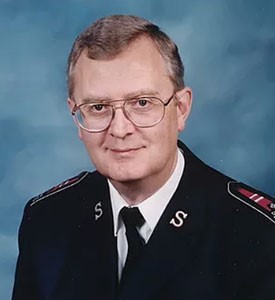 Following the Canadian Staff Band's tour of Australia and New Zealand in 1985, the Redheads were appointed as corps officers of Southmount Corps, Vancouver, and Brian Burditt assumed the responsibility of Staff Bandmaster. A charter member of the band, Brian began the first season on solo cornet, soon moved to flugel horn and eventually became deputy bandmaster. Well known for his training and conducting abilities, he became the first Canadian and lay person to permanently conduct the band.
Following the Canadian Staff Band's tour of Australia and New Zealand in 1985, the Redheads were appointed as corps officers of Southmount Corps, Vancouver, and Brian Burditt assumed the responsibility of Staff Bandmaster. A charter member of the band, Brian began the first season on solo cornet, soon moved to flugel horn and eventually became deputy bandmaster. Well known for his training and conducting abilities, he became the first Canadian and lay person to permanently conduct the band.
Under Brian's leadership, the band's ministry continued to flourish. Overseas tours included Switzerland, Norway, a third visit to England for the 1990 International Congress with General Eva Burrows, and the band's first visit to Bermuda in 1993. Visits to the United States included playing at Walt Disney World in Florida, playing in the 1994 Tournament of Roses Parade in Pasadena, California, and performances at the Great American Brass Band Festival in Danville, Kentucky.
In 1989, former bandmasters Lt-Colonel Norman Bearcroft and Major Robert Redhead returned to help the CSB celebrate its 20th anniversary. Then, in 1994, an historic event was held at Toronto's Roy Thomson Hall to celebrate the band's 25th anniversary. For the first time ever, four staff bands gathered to present an International Brass Spectacular. The International Staff Band, led by Lt-Colonel Robert Redhead, joined with the New York, Chicago and Canadian Staff Bands, and bandmasters from the Melbourne, Amsterdam, German and Japan Staff Bands, to present two unprecedented concerts, necessary to accommodate all those wishing to attend from around the world.
In July 1997, the band visited Brazil, a trip that left a lasting impact on each bandsman privileged to take part. In July 2000, the band took part in the International Millennial Congress in Atlanta, Georgia and in 2001 conducted a second tour of New Zealand and Australia, where at the end of the tour, the band said farewell to four senior band members known affectionately as The Tottenham Four.
During Brian's time of leadership, the band moved from LP recordings to cassette tapes and eventually compact discs. Albums recorded under his leadership included To Serve and To Save, A Pastoral Symphony, Sounds of Joy, Sweet By and By, Spirit of the Pioneers, Praise, In Tribute, Made in Canada, The Southern Cross, Celebrate and Heaven and Earth (with Herb Bruce, trombone). The band was also heard on numerous recordings of music festivals from Roy Thomson Hall in Toronto and other concert venues.
Kevin Hayward 2002 - 2005
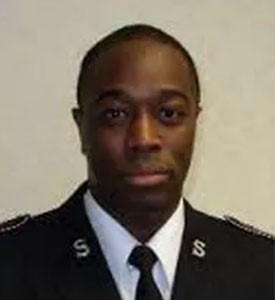 In June 2002, following 17 years of leadership, Brian Burditt retired as bandmaster, to be succeeded by Kevin Hayward. Born in Bermuda, Kevin moved to Toronto in 1985 to complete his university education and had been a member of the band’s trombone section since 1988, serving as deputy bandmaster since 1992.
In June 2002, following 17 years of leadership, Brian Burditt retired as bandmaster, to be succeeded by Kevin Hayward. Born in Bermuda, Kevin moved to Toronto in 1985 to complete his university education and had been a member of the band’s trombone section since 1988, serving as deputy bandmaster since 1992.
Although not embarking on any international tours, the CSB visited seven out of ten Canadian provinces during Kevin’s four years of leadership, including visits to Halifax, Winnipeg, St. John’s, and a 10-day Western Canada Tour in 2005 that took the band to Victoria, Vancouver, Calgary, Edmonton and Saskatoon. It also continued to minister at commissioning events and at the popular Christmas With The Salvation Army programs in Toronto beginning in 2002. A particular highlight was working with world-renowned trumpeter Jens Lindeman to produce a unique recording, Rising Sun, released in 2003.
In 2004, the CSB celebrated its 35th anniversary with a gala festival featuring guest artists Jens Lindeman and Curtis Metcalf, guest conductors Lt-Colonel Norman Bearcroft and Brian Burditt, and a host of CSB alumni. The weekend, which included an anniversary dinner, was a memorable one for all concerned. During the second half of the Saturday night program, former band members joined the current CSB to present a selection of items from the band’s repertoire over the years, including Bearcroft’s Songs of Newfoundland, Just Like John and Timepiece, played by eight euphonium soloists!
Also in 2004, the band played at the Empress of Ireland 90th anniversary memorial service and the closing events for the Toronto College for Officer Training. The band also played before a worldwide audience at the International Mosaic of Worship at Jackson’s Point, Ontario, part of the International Music and Other Creative Ministries Forum organized by Colonels Robert and Gwenyth Redhead.
In 2005, the band ventured into further uncharted waters by playing a concert with Toronto jazz bassist Duncan Hopkins. The result was Red and Brassy, a live recording from the concert featuring the altogether unique sound of a jazz quartet playing alongside a traditional British-style brass band in a number of specially arranged selections. The CD was the last of three albums released under Kevin’s leadership, alongside Rising Sun (with Jens Lindemann, trumpet) and To Worship, which featured music from the band’s concert repertoire.
Unfortunately, following a difficult 2005-2006 season owing to ongoing health concerns, Bandmaster Hayward’s term as leader came to a premature end with the announcement that he was stepping down as of August 1. His final performance with the band came during the CSB’s participation in the 120th annual Newfoundland and Labrador Provincial Congress, which included the closure of the St. John’s College for Officer Training. Unfortunately, Kevin was unable to be with the band for its visit to the Old Orchard Beach Camp Meetings later that summer. However, under the capable leadership of Deputy Bandmaster Steve Brown, the band inspired audiences and made a lasting impression by its participation throughout a memorable weekend.
Brian Burditt 2006 - 2008
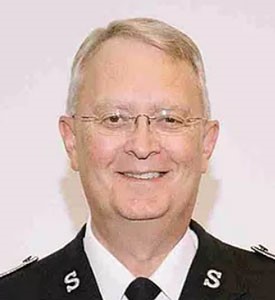 From August 2006 until April 2008, former bandmaster Brian Burditt resumed leadership of the Canadian Staff Band, although under somewhat different circumstances. Recognizing the need for interim leadership during a period of transition, he agreed to lead the band in addition to his full-time job as director of world missions for the Canada and Bermuda Territory until a permanent bandmaster could be found.
From August 2006 until April 2008, former bandmaster Brian Burditt resumed leadership of the Canadian Staff Band, although under somewhat different circumstances. Recognizing the need for interim leadership during a period of transition, he agreed to lead the band in addition to his full-time job as director of world missions for the Canada and Bermuda Territory until a permanent bandmaster could be found.
Under Brian’s second term of leadership, the CSB visited Southern California in December 2006 for the 2007 Tournament of Roses Parade in Pasadena. Later that year, the CSB was also a big part of Celebration 125, the territory’s 125th anniversary celebrations in Winnipeg in June. The band also undertook a major overseas visit with its 10-day trip to Mexico City in March 2008, where they ran a territorial music school and were featured in events throughout Easter weekend. All of this occurred in addition to regular corps engagements and the usual Christmas events in Toronto.
During this period the band continued its ongoing ministry through a number of extra projects, most notably the contribution of instruments for beginners’ bands throughout the territory, thanks to the generous support of Yamaha Canada, and the donation of instruments to Army bands in developing countries around the world.
One final project, an international recording entitled Windows of the World, also came to fruition under Bandmaster Burditt's leadership. The four-CD set features contributions from staff music sections and other territorial groups from around the Army world and is the first such recording in Army history. Born out of Brian’s intense passion for world missions, this project marks the fulfilment of a dream he first had when leading the CSB several years ago. Proceeds from all sales benefit the Army’s work in developing countries around the world.
John Lam 2008-Current
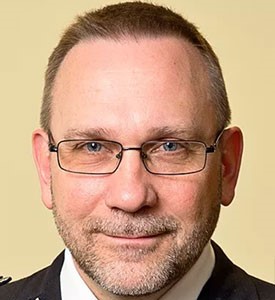 In April 2008, John Lam was appointed as the fifth bandmaster of the Canadian Staff Band. A professional musician and music educator, John is currently the Head of Arts at Glendale High School in Tillsonburg, Ontario, and is the corps bandmaster at The Salvation Army London Citadel.
In April 2008, John Lam was appointed as the fifth bandmaster of the Canadian Staff Band. A professional musician and music educator, John is currently the Head of Arts at Glendale High School in Tillsonburg, Ontario, and is the corps bandmaster at The Salvation Army London Citadel.
In taking over the CSB, Bandmaster Lam brought his own unique vision and leadership style and immediately put his own stamp on the band's musical presentations. In his first two years two new CDs were released under his direction, as well as a two-CD set containing music from old LP albums made in the band's first ten years. The project coincided with the band's 40th Anniversary, celebrated with a gala festival at Scarborough Citadel in May 2009.
In 2011, the CSB undertook a tour of The Netherlands and Germany prior to its participation in a memorable weekend of events celebrating the 120th Anniversary of the International Staff Band in London, England. Along with seven other staff bands from around the Army world, the CSB took part in a history-making brass band extravaganza at the Royal Albert Hall and a large march of witness to Buckingham Palace.
The year 2012 saw the CSB participate in The Hannaford Street Silver Band's annual Festival of Brass as well as host trumpet virtuoso Jens Lindemann for its 43rd anniversary festival. It also took part in the public welcome meeting for The Salvation Army's International Conference of Leaders in Mississauga, Ontario, led by General Linda Bond.
In 2013, the CSB visited Columbus, Ohio, for the annual God and Country weekend, then hosted the Amsterdam Staff Band on its third tour of Canada, uniting with them for a memorable concert in Toronto to celebrate the CSB's 44th anniversary.
A highlight of 2014 includes the band’s presence at Mt. Pleasant Cemetery to mark the 100th anniversary of the sinking of the Empress of Ireland in May. Bandsman Steve Pavey gave a short speech on the impact of the sinking on the early staff band. In addition, a CSB ensemble travelled to Rimouski, Quebec to help mark the 100th anniversary there. The band members came tangibly close to the site, graves, and relics of this disaster, particularly as it relates to The Salvation Army and the CSB. Late in the year, the band was able to send another ensemble to Newfoundland to help lead and support a provincial music camp. Also, the CSB travelled to Chicago in November for Chicago’s annual Thanksgiving concert, and the members were pleased to be there to mark Bill Himes’ final year as the bandmaster of the Chicago Staff Band.
In 2015, the band was able to spend weekends at Mountain Citadel, Oshawa Temple, Winterberry Heights, and Parry Sound corps, supporting the corps in worship and outreach. Other highlights of the year included the 46th anniversary concert in May which featured the Household Troops Band from England. The CSB also performed and was very well received by the youth at our Territorial Music School at Jackson’s Point in August.
A key point of 2016 was the visit of the staff band to Long Beach, California to help the Western Territory Staff Band mark their 10th anniversary by performing in concert with the North American staff bands. Staying on the Queen Mary hotel was unique, and made for good fellowship with members from the other bands. Now in its 46th year of service, the Canadian Staff Band continues to seek to be effective in musical and spiritual ministry. Having seen a turnover in some key members of the band over the summer, we eagerly anticipate what God has in store for us through this ministry.




